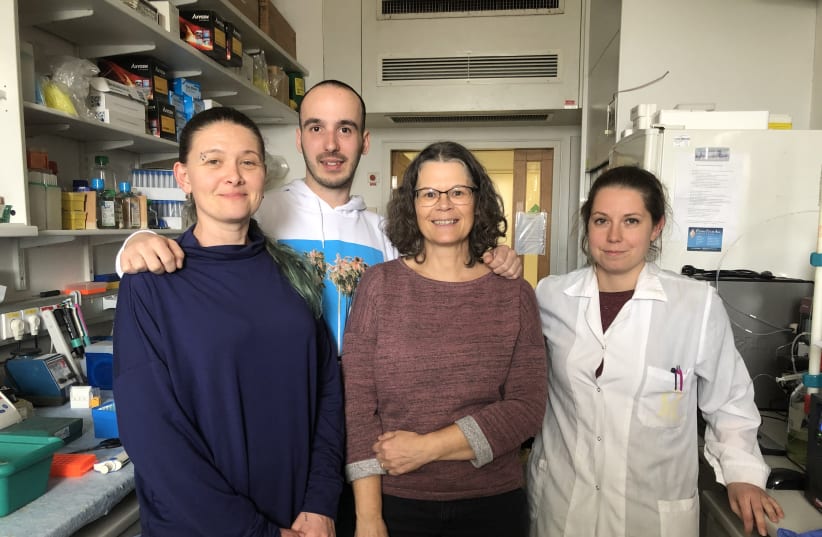Beersheba team creates treatment for colorectal cancer that has spread in the body
The developed technology was recently licensed to a biomedical company (Vaxil Biotherapeutics) for further clinical development.
A nano-sized polymer, developed and tested on mice by a research team from Ben-Gurion University of the Negev (BGU) in Beersheba that can selectively deliver chemotherapeutic drugs to blood vessels that feed tumors and metastases, has emerged as an effective treatment for advanced cancer.
The polymer eliminates colorectal cancer liver metastases and prolongs mice survival, after only a single-dose therapy. The findings were published in Nano Today, a leading journal in the field of nanotechnology.
Colorectal cancer (CRC) is the third-most-diagnosed malignancy and the third-most-common cause of cancer-related death in both men and women in the US.
The liver is the most common site for CRC metastasis – cancer traveling to another part of the body – with around 70% of patients ultimately developing liver metastases. Treatment options for metastatic disease are scarce, and while surgery remains the gold standard, many patients need additional therapies (chemo, targeted, or immunotherapy) for treatment that doctors and patients say are not a cure.
Targeted therapies and immunotherapies directed against specific features of the tumor have emerged as promising therapeutic strategies for cancer patients, but their efficacy is often limited by the large variety of mutation profiles of CRC tumors, many of them conferring resistance to specific treatments.
Research process
Prof. Ayelet David and her research team developed a tiny polymer (two to five nanometers in size – one billionth of a meter) for delivering chemotherapeutic drugs into endothelial cells at the inner lining of blood vessels that support tumor growth. The polymer carries a targeting peptide that binds to the adhesive molecule E-selectin that is expressed exclusively on endothelial cells of new blood vessels that are created to feed growing tumors and thus can deliver drugs selectively to tumors and metastatic sites.
Once the polymer binds and enters the endothelial cells, it releases the toxic drug, thereby reducing the blood supply to growing tumors and metastases. Since the polymer is much larger in size than conventional chemotherapeutic molecules, it can’t leak from blood vessels to reach other healthy tissues and thus significantly reduces the risk of side effects of chemotherapy drugs.
Previous studies conducted in David’s laboratory have shown that the unique polymer slows the progression of solid Lewis lung carcinoma tumors and significantly extends the survival time of mice with melanoma (skin cancer) metastases in the lungs.
IN A RECENT study, doctoral student Marie Rütter in David’s research group showed that the polymer is not only effective in treating solid tumors but can actually cure mice with colorectal cancer metastases that have already spread to the liver. Rütter won the Teva Pharmaceuticals Award for excellence in research at the conference of the Israeli Society for Controlled Release.
About half of the mice that presented a significant number of CRC liver metastases had fully recovered from the disease after a single dose of polymer therapy, and the long-term survival time of the mice was doubled compared to mice treated with a conventional chemotherapy drug.
“Colon cancer is a very aggressive tumor that spreads very quickly to the liver. About a quarter of the patients with CRC present liver metastases at the time of diagnosis,” David explained. “The available personalized treatments may prolong survival and improve quality of life for many patients with metastatic disease, although a cure is rare, and recurrence is expected.
“Our unique polymer demonstrates promising preclinical results for treating advanced cancer that has spread to other places in the body and usually cannot be cured or controlled with other therapies.”
About half of mice with established colorectal cancer liver metastases survived after a single-dose treatment without presenting adverse effects. This is a remarkable advantage, indicating that the polymer accurately hits the target and eliminates the metastases from the liver of mice that responded well to the treatment.
“These findings support the results of our previous studies, showing that a single dose cures half of the mice with established melanoma lung metastases. The therapy doesn’t demand a pre-treatment assessment for gene mutations in tumors to achieve favorable clinical outcomes.”
So far, the research team has succeeded in validating treatment efficacy in various mouse models of cancer. The developed technology was recently licensed to a biomedical company (Vaxil Biotherapeutics) for further clinical development.
The company is pursuing all the necessary steps to initiate human clinical trials as soon as possible.“This is an excellent example of a fruitful collaboration between universities and the biotech industry to accelerate drug development,” said Dr. Galit Mazooz-Perlmuter, vice president for business development at BGN Technologies, the university’s technology transfer company. “This is exactly the way to turn scientific breakthroughs into technological advancements in Israel.”



No comments:
Post a Comment
Stick to the subject, NO religion, or Party politics